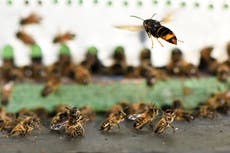Asian hornet alert as insects spotted in UK
Large wasps that eat honeybees found in Essex
Asian hornets, which pose a risk to honeybees, have been spotted in the UK for the first time in five months.
Beekeepers and the public are being asked to remain vigilant after the large wasps that threaten bees were identified in the Rayleigh area of Essex.
The National Bee Unit has confirmed the sighting, and monitoring is underway to detect more Asian hornets in the vicinity, the government says.
It is the first confirmed sighting since April, when a single Asian hornet was captured in Felixstowe, Suffolk.
The non-native Asian or yellow-legged hornet is an invasive species in Britain that eats honeybees.
“The hornets raid honeybee hives by sitting outside them and capturing workers as they go in and out,” says Natural History Museum expert Gavin Broad.
“They chop them up and feed the thorax to their young.”
Asian hornets were introduced to France by accident in 2004, probably in a shipment of goods from east Asia. It has consumed large numbers of bees in France, including the European honeybee and lesser-known solitary and colonial bee species, according to the RSPB.
Since then, the species has spread rapidly and is now in adjoining countries.
In 2018 there were nine sightings in England alone, and five in 2019.

UK government officials are appealing to people to keep a lookout.
The Asian hornet (Vespa velutina) is mostly black with a single yellow or orange band at the top of its abdomen, yellow legs and an orange face. It is slightly smaller than the native European hornet but larger than a wasp.
Nicola Spence, chief plant and bee health officer at the Department for Environment, Food and Rural Affairs (Defra), said: “By ensuring we are alerted to possible sightings as early as possible, we can take swift and effective action to stamp out the threat posed by Asian hornets.
“That’s why we are working at speed to locate and investigate any nests in the area following this confirmed sighting.

“While the Asian hornet poses no greater risk to human health than other wasps or hornets, we recognise the damage they can cause to honeybee colonies and other beneficial insects.
“Please continue to look out for any Asian hornets and if you think you’ve spotted one, report your sighting through the Asian hornet app or online.”
Experts say people should take care not to approach or disturb a nest.
“Asian hornets are not generally aggressive towards people but an exception to this is when they perceive a threat to their nest,” Defra said.
Sightings can be reported with the Asian Hornet Watch app or a government online report form.
Join our commenting forum
Join thought-provoking conversations, follow other Independent readers and see their replies
Comments


Bookmark popover
Removed from bookmarks